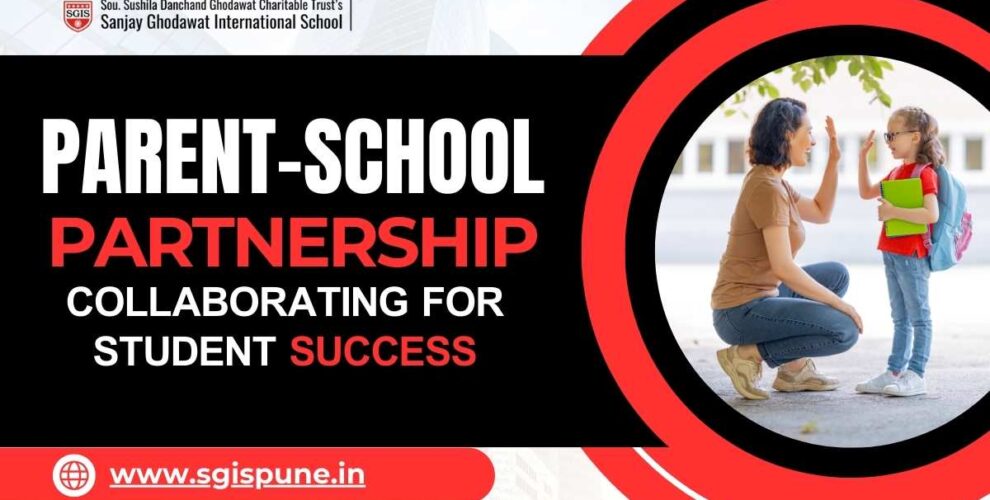In the journey of a child’s schooling, the partnership between parents and teachers plays a significant part in promoting academic accomplishment and individual growth. Powerful parent-school partnership form an empowering and productive atmosphere that ensures that learners get constant motivation and guidance both at home and at school. In this blog, we will explore the significance of such partnerships between parents and teachers along with tips for building effective relationships that benefit the success of the student.
The Importance of Parent-Teacher Partnership

Parent-school partnership has a huge significance on a child’s overall growth. The given points justify why this collaboration holds such immense importance in schools:
1. Improved Communication: Compelling communication between parents and teachers supports conveying useful understandings about a kid’s skills, obstacles, and improvement. Constant updates and meetings confirm that both groups are well aware and can collectively handle any problems that might occur in the future.
2. Constant Support: When parents and teachers operate jointly, they deliver consistent help to the child. This cooperative strategy supports educational and behavioral anticipations which creates a steady and favorable atmosphere for the learner.
3. Enhanced Academic Performance: The study reveals that learners whose parents are vigorously interested in their schooling manage to accomplish sufficiently academically. These pupils often possess increased attendance rates, finer grades, and a more favorable perspective toward the academy.
4. Social and Emotional Development: Cooperation between parents and educators plays a key part in a child’s social and emotional development. When children observe their parents and teachers working together, it builds a sense of security and boosts their confidence. This support system helps children feel cared for both at home and in school which enhances their overall well-being.
5. Early Intervention: When parents and teachers work closely, they can quickly identify any learning or behavioral concerns. This premature identification permits them to execute rapid action, providing strategies and support to help the child overcome challenges. By addressing issues early, children are more likely to succeed and progress in their education.
Practical Tips for Building Effective Parent-Teacher Partnerships
Here are some crucial tips on how parents and teachers can collaboratively work together to support overall child’s growth:

1. Establish Open Lines of Communication: Clear communication is crucial for maintaining a strong parent-school partnership. Both parents and schools need to keep the queues of transmission unrestricted and honest. Here are some ways to achieve this:
- Regular Updates: Teachers can send frequent updates through emails, newsletters, or reliable communication apps. These updates should cover classroom activities, forthcoming occasions, and the kid’s improvement.
- Scheduled Meetings: Holding regular parent-teacher conferences gives both parties a chance to discuss the child’s development in detail. These meetings should allow both parents and teachers to share their observations and concerns which promotes a two-way exchange.
- Accessibility: Instructors should be approachable and available to parents for inquiries or meetings beyond planned sessions. Parents should feel convenient reaching out to teachers whenever necessary.
2. Create a Welcoming Environment: A welcoming school environment encourages greater parental involvement. Schools can make this happen by:
- Inviting Participation: Schools should encourage parents to join in school activities, volunteer, or attend classroom events. This involvement helps parents feel more connected to their child’s learning journey.
- Cultural Sensitivity: Schools should acknowledge and respect cultural differences to ensure that all families feel valued and welcomed. By adopting diversity, academies create an atmosphere where everyone feels included.
3. Set Clear Expectations: Precise anticipations help everyone comprehend their positions and duties. This can be achieved by:
- Outlining Roles: Schools can deliver clear guidelines highlighting the roles of teachers, parents, and students. This can be done through handbooks, meetings, or orientation sessions.
- Setting Goals: Teachers and parents should work together to set academic and behavioral goals for the student. These goals should be realistic, measurable, and revisited regularly to track progress.
4. Encourage Parental Involvement at Home: Parents play a crucial role in supporting their child’s learning at home. Teachers can encourage this by:
- Providing Resources: Teachers can share helpful resources like reading lists, educational websites, and homework tips. Such parent-school partnership support the child’s education outside the classroom.
- Offering Guidance: Teachers can guide parents on how to assist with homework, time management, and creating an ideal learning environment at home.
5. Celebrate Successes Together: Recognizing and celebrating achievements, no matter how small, strengthens the bond between parents and teachers and boosts the child’s confidence. Schools can:
- Acknowledge Achievements: Schools should regularly recognize students’ academic and personal milestones, using certificates, awards, or positive notes to celebrate success.
- Share Positive Feedback: Teachers should share positive feedback with parents which highlights the child’s progress and efforts. This leads to good behavior and motivates children to continue working hard.
Conclusion
Building a strong parent-school partnership is essential for creating an influential and validating academic setting. By maintaining contact, making a welcoming environment, setting clear anticipations, promoting involvement, and praising achievements, both parents and educators can operate jointly to help pupils reach their highest prospects.
Sanjay Ghodawat International School, Pune, exemplifies the strength of powerful parent-school relationships in building a flourishing school community. We believe in open communication, collective decision-making, and regular involvement to enhance the overall learning experience of a child. School’s commitment to constant enhancement and invention makes sure that these collaborations will resume to grow and thrive, helping pupils, parents, and educators alike.
Also read: 7 Ways Goal Setting Boosts Your Child’s Success in School








Leave a Reply